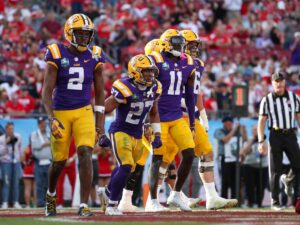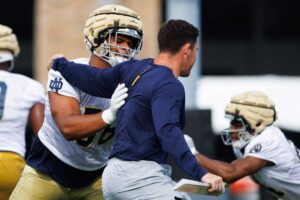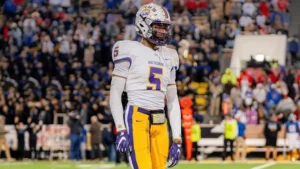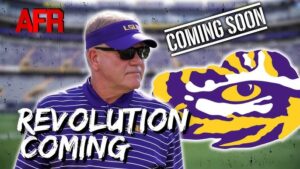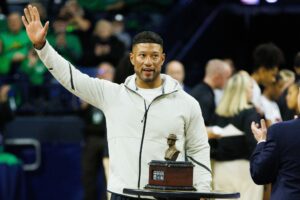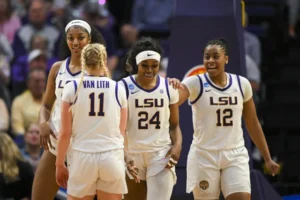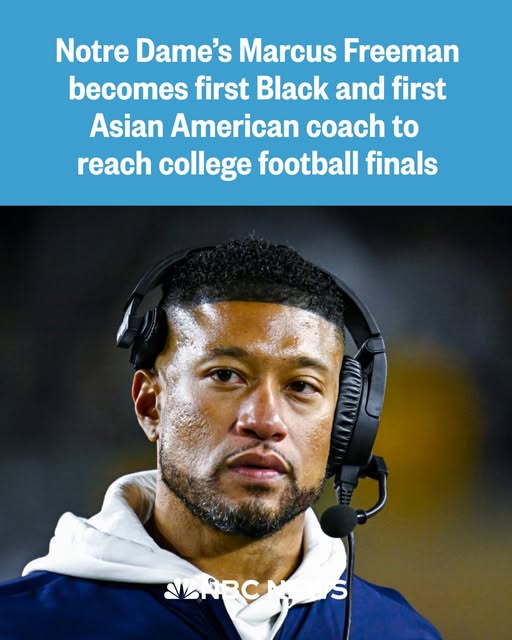
Notre Dame’s Marcus Freeman Makes History as First Black and Asian American Coach to Reach College Football Finals
In a remarkable moment for both Notre Dame and college football, Marcus Freeman has made history by becoming the first Black and first Asian American coach to guide his team to the College Football Playoff National Championship. Freeman’s journey to this historic achievement is not just a tale of athletic excellence, but also one that reflects the diversity, resilience, and cultural richness that he brings to the game. As head coach of the Fighting Irish, Freeman has been a trailblazer, both on the field and off it, standing as a symbol of inclusion and progress in the world of college athletics.
A Historic Appointment
Marcus Freeman’s rise to the head coaching position at Notre Dame in 2021 was already a significant moment in college football. At just 35 years old, Freeman’s promotion from defensive coordinator to head coach was widely regarded as one of the boldest decisions in Notre Dame’s storied history. His appointment was particularly notable for his ethnic background: Freeman is of both African American and Korean American descent, an intersection of identities that made his appointment as head coach an inspiring milestone for many.
Freeman’s journey to the top was not a direct path; it was a combination of hard work, resilience, and the support of his family, coaches, and mentors. The road to coaching excellence began long before he stepped onto the sideline at Notre Dame.
Early Life and Cultural Identity
Marcus Freeman was born in the United States, but his background is uniquely shaped by his multicultural heritage. Freeman’s father, an African American, served in the United States Air Force. It was during his father’s service that Freeman’s mother, a native of South Korea, met his father while stationed in South Korea. This international family dynamic shaped Freeman’s worldview and helped him develop a sense of pride in both his African American and Korean American roots.
Growing up, Freeman was immersed in both African American and Korean cultures, experiences that have played a central role in his personal and professional development. He embraced his Korean heritage, even taking up Taekwondo, a traditional Korean martial art. Freeman has spoken in interviews about how his background in Taekwondo helped him cultivate discipline and respect, values that would later serve him well in his coaching career.
“I embraced my Korean background. I did Taekwondo, which is a Korean martial art, growing up,” Freeman shared in an interview. “But also, you know, I did sports and embraced my African American side.”
This dual cultural identity gave Freeman a unique perspective, one that would allow him to connect with athletes from diverse backgrounds. It also provided him with the ability to break down barriers and challenge stereotypes, both in terms of his athletic abilities and his capacity as a leader. As a player, Freeman was known for his leadership on the field, and as a coach, he has been recognized for his ability to inspire and motivate players from all walks of life.
Playing Career and Transition to Coaching
Before becoming the head coach at Notre Dame, Freeman was a standout linebacker at the University of Ohio State, where he played from 2004 to 2008. His skills on the field earned him a spot in the NFL as an undrafted free agent, and he spent time playing for the Chicago Bears and the Buffalo Bills. However, Freeman’s time in the professional league was short-lived, and he soon transitioned to coaching, realizing that his true calling was to mentor young athletes and help them develop both on and off the field.
Freeman’s coaching career began as a graduate assistant at Ohio State, where he learned the ropes of coaching and developed his own philosophy. His strong background as a player, combined with his understanding of leadership, made him an ideal candidate for coaching roles. Freeman’s coaching style is known for its emphasis on discipline, motivation, and building relationships with his players. It’s no surprise that he quickly rose through the ranks of college football, taking on key roles such as the defensive coordinator at Cincinnati, where he earned widespread acclaim for his work with the team’s defense.
Notre Dame and the Path to the National Championship
Freeman’s appointment as head coach at Notre Dame was met with excitement and anticipation. Known for his dynamic coaching style and commitment to excellence, Freeman inherited a Notre Dame program that had already been successful under previous head coach Brian Kelly. However, Freeman’s arrival marked a new era for the Fighting Irish, one that was characterized by a fresh approach to both recruiting and player development.
Freeman’s leadership and strategic vision quickly began to pay off. Under his stewardship, the Notre Dame defense showed significant improvement, and Freeman’s leadership style was hailed as a refreshing change in a sport that has often struggled with issues of diversity and representation in coaching ranks.
Despite the challenges that come with being the head coach of one of college football’s most prestigious programs, Freeman demonstrated exceptional resilience. In his first season as head coach, Freeman led the Fighting Irish to a successful campaign, culminating in a spot in the College Football Playoff (CFP) National Championship Game. This was a historic achievement not only for Freeman personally but for Notre Dame, a school with a rich football history and an ongoing commitment to excellence.
Breaking Barriers
Freeman’s achievement is especially significant when placed in the context of diversity in college football coaching. Historically, the ranks of college football coaches have been overwhelmingly dominated by white men, with little representation of people of color in top leadership roles. Freeman’s success, therefore, is not just a personal triumph—it’s a symbolic victory for minority coaches who have long fought for greater representation and recognition in the sport.
As Freeman broke barriers and led the Fighting Irish to the national championship, he became a role model for young athletes and aspiring coaches from diverse backgrounds. His success is a testament to the power of perseverance, talent, and the ability to remain true to one’s identity in the face of adversity.
“I’ve always been proud of who I am and where I come from,” Freeman has said. “My background gives me a unique perspective, and I think that’s something that helps me connect with players. I want them to see that no matter where you come from, you can achieve greatness if you work hard and stay true to yourself.”
Leadership and Influence on the Team
Freeman’s leadership has been a defining characteristic of his tenure at Notre Dame. He has worked tirelessly to build a strong, cohesive team and foster a culture of accountability, respect, and discipline. His players have consistently praised his ability to motivate them and his genuine concern for their personal development.
Under Freeman, the Notre Dame Fighting Irish have not only excelled on the football field but have also embodied the values that Freeman holds dear: hard work, determination, and inclusivity. Freeman’s leadership style focuses on empowering players and helping them achieve both personal and athletic success. He has worked to ensure that every player, regardless of their background or identity, feels valued and supported within the program.
Freeman’s influence extends beyond the football field. He has also emphasized the importance of education, personal development, and community involvement. His players are encouraged to excel academically, engage in meaningful community service, and grow as leaders both on and off the field. This holistic approach to coaching has set Freeman apart from other coaches in college football and helped to solidify his reputation as one of the most respected young coaches in the sport.
The Road Ahead
As Marcus Freeman prepares for the College Football Playoff National Championship, the entire Notre Dame community—players, fans, and alumni—are buzzing with excitement and pride. Freeman’s leadership has already left a lasting impact on the program, and regardless of the outcome of the national championship, his legacy as a trailblazer for diversity and inclusion in college football is firmly established.
Freeman’s success also sends a powerful message to young athletes of color, particularly those from underrepresented backgrounds. It demonstrates that with hard work, determination, and an unwavering commitment to one’s goals, anything is possible. Freeman’s story is a reminder that success in college football is not determined solely by one’s background or ethnicity—it’s about the willingness to rise above obstacles and make a difference in the world.
Marcus Freeman’s journey from a young athlete to the first Black and Asian American head coach to reach the College Football Playoff National Championship is a testament to his perseverance, vision, and leadership. Freeman has broken down barriers, reshaped the narrative around diversity in college football, and set an example for future generations of coaches and players. His story is one of inspiration, and as he continues to lead Notre Dame, Freeman is sure to leave a lasting legacy in the world of college football.
As Notre Dame takes the field in the National Championship Game, Marcus Freeman will be more than just a coach—he will be a symbol of progress, an embodiment of the American Dream, and a beacon of hope for young athletes who dare to dream of a future in which they too can make history.
